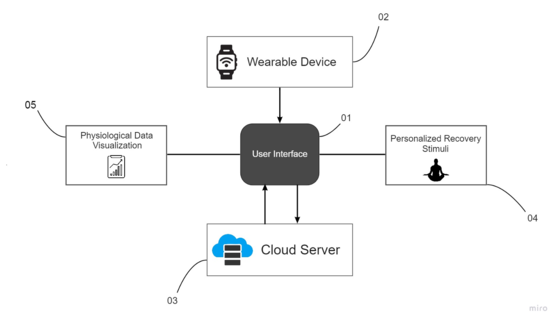In This Story

Substance use disorder affects more than 46 million Americans according to the 2021 National Survey on Drug Use and Health. Recovery can be a difficult path, but an interdisciplinary team led by Holly Matto, associate professor in the Department of Social Work, aims to make it a little easier through a recently patented technology-based recovery support system.
Matto and College of Science Professor Padmanabhan Seshaiyer received the patent for a mobile technology to help those in recovery overcome triggers that lead to relapse. The technology is a real-time, cloud-based support system that helps manage behavioral responses—for example, the desire to use opioids—by monitoring physical symptoms, such as changes to a person’s heart rate, to identify when someone needs help to overcome a triggering event. With up to 60 percent of patients experiencing relapse within one year of treatment, the support is critical.
“The patent recognizes our unique contribution to the expanding availability of digital health technologies designed to improve access to timely support,” says Matto. The patent is believed to be the first received by a faculty member from the Department of Social Work.
.

Known as Recovery Engaged Mind-Health (REMind-h), the technology allows individuals in recovery to identify personally meaningful recovery-affirming sensory cues, which might include positive images, sounds, or other sensory stimuli that reinforce their commitment to recovery. Some examples might include peaceful nature scenes, a soundscape, motivational quote, or a sponsor’s message. These data are stored in the system’s cloud server and are activated and delivered to the person when their physiological metrics rise above the trained threshold, cycling through the available cues until regulation is restored.
“By using technology to monitor physiological responses, people in recovery can immediately have a personalized support system right there on their phone when they need it to help them manage the triggering moment,” says Matto. “The goal is to avoid relapse and, ultimately, to improve their quality of life.”
Matto says the patent has allowed the research team to partner with LifeSpan Digital Health LLC, which will license the technology. The technology prototype has already been developed by Rudra Nagalia, a graduate student in Health Administration and Policy and a member of the research team.
Matto began work on the idea behind the patent several years ago. She and Seshaiyer first teamed up to develop the technology after receiving a multidisciplinary grant from the provost’s office in 2015. They were selected for Mason’s National Science Foundation Innovation Corps Site Program in 2018, where they conducted interviews and gathered preliminary feedback on the concept.
Since then, Matto and Seshaiyer have also received a National Institutes of Health Small Business Technology Transfer sub-award to further test some of their recovery cue ideas. Bryce Dunn, PhD student in bioengineering, worked with the team on the grant to examine the regulating impact of recovery cues after exposure to substance-related cues in a virtual reality simulation. College of Engineering and Computing faculty member Nathalia Peixoto, a member of this interdisciplinary research team, offered expertise in measuring physiological and neural responses in the VR simulation, to help test the theory that personalized recovery cues help regulate reactivity to drug-stimuli exposures.
